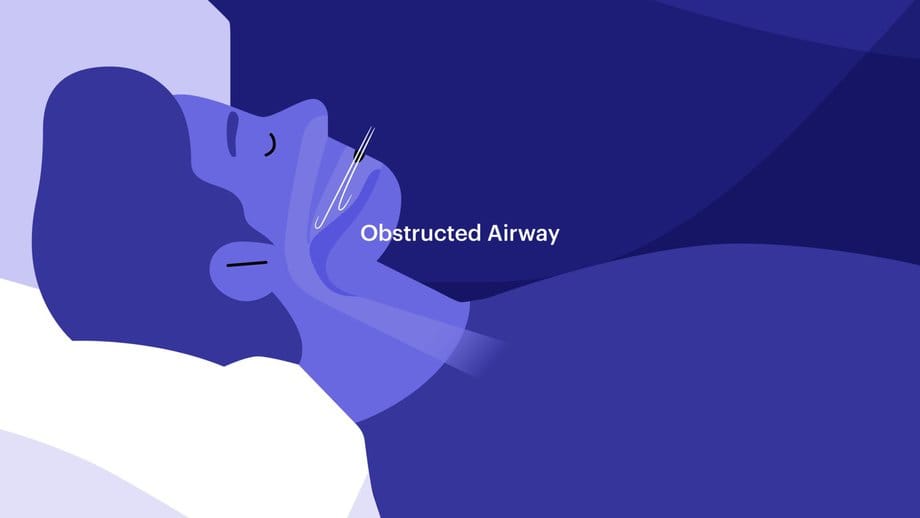What Is Sleep Apnea And How Does It Affect Your Health?

Sleep apnea is a common sleep disorder characterized by pauses in breathing or shallow breathing while sleeping. These pauses can last for a few seconds to several minutes and can occur multiple times throughout the night. This condition can significantly impact an individual’s health and overall well-being.
Recognizing the symptoms of sleep apnea is crucial in order to seek appropriate medical attention. Common symptoms include loud snoring, excessive daytime sleepiness, morning headaches, and difficulty concentrating.
The effects of sleep apnea on health are far-reaching. It can lead to a variety of complications, including high blood pressure, heart disease, stroke, and diabetes. Additionally, sleep apnea can have a negative impact on mental health, increasing the risk of depression and anxiety.
Diagnosing sleep apnea typically involves a sleep study, where a person’s sleep patterns and breathing are monitored overnight. Treatment options for sleep apnea include lifestyle changes, such as weight loss and avoiding alcohol and sedatives, as well as the use of continuous positive airway pressure (CPAP) machines or oral devices.
It is crucial to seek professional help for sleep apnea, as untreated sleep apnea can lead to serious health complications. Managing sleep apnea effectively can greatly improve an individual’s quality of life and overall health.
Key Takeaways
- Sleep apnea is a common sleep disorder characterized by pauses in breathing or shallow breathing while sleeping.
- Sleep apnea can lead to complications such as high blood pressure, heart disease, stroke, and diabetes.
- Sleep apnea can increase the risk of depression and anxiety.
- Seeking professional help is crucial for effectively managing sleep apnea.
Understanding Sleep Apnea
Sleep apnea is a chronic sleep disorder characterized by repetitive pauses in breathing during sleep, which can lead to various health complications. It can be classified into three types: obstructive sleep apnea (OSA), central sleep apnea (CSA), and complex sleep apnea syndrome (CSAS).
OSA is the most common form, caused by a physical blockage or collapse of the airway. CSA, on the other hand, occurs when the brain fails to send proper signals to the muscles that control breathing. CSAS is a combination of both OSA and CSA.
Sleep apnea can have significant negative impacts on an individual’s health, including excessive daytime sleepiness, difficulty concentrating, high blood pressure, heart disease, stroke, and increased risk of accidents.
It is important to understand sleep apnea to identify and manage it effectively for better overall health.
Recognizing Symptoms of Sleep Apnea
Recognizing symptoms of sleep apnea involves being aware of indicators that manifest during periods of interrupted breathing during sleep.
One of the most common symptoms is loud and chronic snoring, often accompanied by choking or gasping sounds.
Individuals with sleep apnea may also experience excessive daytime sleepiness, even after a full night’s sleep. They may feel irritable, have difficulty concentrating, and struggle with memory problems.
Additionally, sleep apnea can lead to morning headaches, dry mouth, and a sore throat upon awakening.
Some individuals may also report experiencing nocturia, which is the need to urinate frequently during the night.
It is important to note that not everyone with sleep apnea will exhibit all of these symptoms, and the severity of symptoms can vary. Therefore, seeking a professional diagnosis is crucial for proper management and treatment.
The Impact of Sleep Apnea on Health
The presence of untreated sleep apnea can have significant repercussions on overall well-being and may contribute to the development or exacerbation of various health conditions.
- Increased risk of cardiovascular diseases: Sleep apnea has been linked to an increased risk of hypertension, heart attack, stroke, and irregular heart rhythms. The repeated interruptions in breathing during sleep can strain the cardiovascular system and lead to these serious health issues.
- Daytime fatigue and reduced productivity: The fragmented sleep caused by sleep apnea can result in excessive daytime sleepiness, decreased concentration, and impaired cognitive function. This can negatively impact daily activities, work performance, and overall quality of life.
- Mental health disorders: Sleep apnea has been associated with an increased risk of developing mood disorders such as depression and anxiety. The disrupted sleep patterns can disrupt the balance of neurotransmitters in the brain and contribute to mental health issues.
- Metabolic disturbances: Sleep apnea is linked to metabolic disorders such as insulin resistance, obesity, and type 2 diabetes. The hormonal imbalances caused by sleep apnea can affect glucose regulation and metabolism, leading to these metabolic disturbances.
Diagnosing Sleep Apnea
One effective method for diagnosing sleep apnea involves conducting a sleep study, which monitors various physiological parameters during sleep to identify patterns indicative of the condition.
During a sleep study, a patient’s breathing, heart rate, oxygen levels, and brain activity are monitored using sensors placed on the body. This allows healthcare professionals to observe any interruptions or abnormalities in breathing that are characteristic of sleep apnea.
The study typically takes place in a sleep laboratory or can sometimes be done at home with portable monitoring devices. By analyzing the data collected during the study, healthcare professionals can determine the severity of sleep apnea and develop an appropriate treatment plan.
It is important to diagnose sleep apnea accurately as untreated sleep apnea can lead to a range of health complications, including hypertension, cardiovascular disease, and daytime fatigue.
Treatment Options for Sleep Apnea
Treatment options for sleep apnea include lifestyle changes, such as weight loss and exercise, as well as the use of continuous positive airway pressure (CPAP) devices, which help keep the airway open during sleep.
Other treatment options for sleep apnea may include the following:
- Oral Appliances: These devices are designed to reposition the jaw and tongue to help keep the airway open. They can be effective for mild to moderate cases of sleep apnea.
- Surgery: In some cases, surgery may be recommended to remove excess tissue from the throat or to reposition the jaw. However, surgery is typically considered a last resort when other treatment options have failed.
- Positional Therapy: This involves using devices or techniques to keep the individual in a specific sleep position that helps prevent the airway from becoming blocked.
- Inspire Therapy: This is a relatively new treatment option that involves the implantation of a device that stimulates the nerves controlling the tongue and other airway muscles, helping to keep the airway open during sleep.
Overall, the choice of treatment option for sleep apnea will depend on the severity of the condition, individual preferences, and other factors, and should be discussed with a healthcare professional.
Potential Complications of Untreated Sleep Apnea
Untreated sleep apnea can lead to a range of potential complications, including cardiovascular problems and cognitive impairment.
One of the most significant complications of untreated sleep apnea is the increased risk of developing cardiovascular diseases. The repeated episodes of oxygen deprivation during sleep can strain the cardiovascular system, leading to high blood pressure, heart disease, and even stroke.
Additionally, untreated sleep apnea has been associated with an increased risk of developing cognitive impairment and neurodegenerative diseases such as Alzheimer’s disease. The intermittent oxygen deprivation and disrupted sleep patterns can negatively impact brain function and memory consolidation.
Furthermore, untreated sleep apnea has been linked to an increased risk of accidents, due to excessive daytime sleepiness, as well as a decreased quality of life and overall well-being.
Therefore, it is crucial to seek appropriate treatment for sleep apnea to prevent these potentially serious complications.
Tips for Managing Sleep Apnea
Untreated sleep apnea can lead to a range of potential complications, making it essential to manage this condition effectively. Fortunately, there are several tips that can help individuals with sleep apnea improve their quality of sleep and overall health.
One important aspect of managing sleep apnea is making certain lifestyle changes. For instance, maintaining a healthy weight through regular exercise and a balanced diet can significantly reduce the severity of sleep apnea symptoms. Additionally, avoiding alcohol and sedatives, which can relax the muscles in the throat and disrupt breathing, is crucial.
Using a continuous positive airway pressure (CPAP) machine during sleep is another effective way to manage sleep apnea symptoms. This device delivers a constant flow of air pressure, keeping the airways open and preventing breathing pauses.
Seeking professional medical advice and adhering to a customized treatment plan is paramount in effectively managing sleep apnea.
The Importance of Seeking Professional Help
Seeking professional assistance is crucial for effectively managing sleep apnea and preventing potential complications. Sleep apnea is a serious sleep disorder characterized by repeated pauses in breathing during sleep. It can lead to various health problems such as high blood pressure, heart disease, and stroke. Seeking help from healthcare professionals, such as sleep specialists or pulmonologists, is important as they can accurately diagnose the condition and provide appropriate treatment options. These professionals may recommend lifestyle changes, such as weight loss or avoiding alcohol and sedatives, as well as the use of continuous positive airway pressure (CPAP) therapy. CPAP therapy involves wearing a mask that delivers a constant flow of air to keep the airway open during sleep. Additionally, seeking professional help allows for regular monitoring and adjustments to the treatment plan, ensuring optimal management of sleep apnea.
| Pros of Seeking Professional Help | Cons of Not Seeking Professional Help | |||
|---|---|---|---|---|
| Accurate diagnosis | Increased risk of health complications | |||
| Tailored treatment options | Ineffective management of symptoms | |||
| Regular monitoring and adjustments | Lack of knowledge about the condition | Improved quality of life | Limited access to resources and support | |
| Expert guidance and support | Potential worsening of the condition | |||
| Better understanding of the condition | Missed opportunity for early intervention | |||
| Emotional and psychological support | Increased burden on family and friends | |||
| Access to specialized therapies or treatments | Delayed recovery or healing | |||
| Education and empowerment to manage the condition | Financial implications of self-treatment | |||
| Prevention of further complications | Social and interpersonal challenges | |||
| Increased chances of successful outcomes | Negative impact on overall well-being | |||
| Professional advocacy and navigation of the healthcare system | Potential strain on personal relationships | |||
| Development of coping mechanisms and resilience | Reduced productivity and impaired functioning | |||
| Holistic approach to care | Isolation and feelings of loneliness | |||
| Enhanced safety and reduced risk of harm | Negative impact on self-esteem and self-confidence |
Frequently Asked Questions
Can sleep apnea be cured completely with treatment?
Sleep apnea cannot be completely cured with treatment, but it can be effectively managed. Treatment options include continuous positive airway pressure (CPAP) therapy, oral appliances, surgery, and lifestyle changes, all aimed at reducing the symptoms and improving quality of sleep.
Is there a specific age group more prone to developing sleep apnea?
There is no specific age group that is more prone to developing sleep apnea. However, certain factors such as obesity, smoking, and family history can increase the risk of developing the condition.
Can sleep apnea lead to other serious health conditions?
Sleep apnea can lead to other serious health conditions such as cardiovascular diseases, hypertension, stroke, and diabetes. It is important to diagnose and treat sleep apnea to reduce the risk of developing these associated health problems.
Are there any natural remedies or lifestyle changes that can help manage sleep apnea?
Natural remedies and lifestyle changes can help manage sleep apnea. These include maintaining a healthy weight, exercising regularly, avoiding alcohol and sedatives, sleeping on your side, keeping the airways open, and using nasal devices or mouthpieces.
How long does it take to see improvement in sleep apnea symptoms with treatment?
The time it takes to see improvement in sleep apnea symptoms with treatment varies depending on the individual and the type of treatment. Some individuals may experience improvement within weeks, while for others it may take several months.









